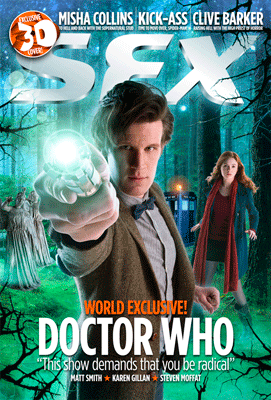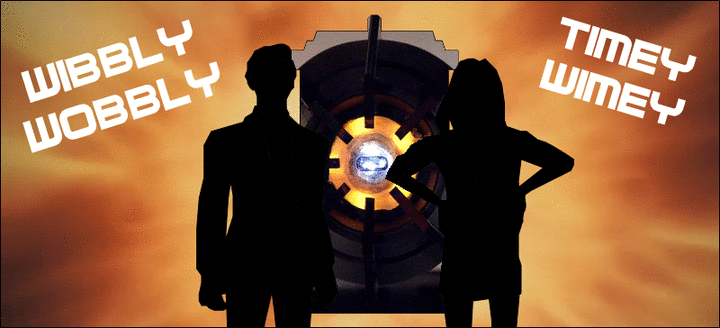
SFX have published a interesting interview with Gareth Roberts who wrote the lodger:
“The Lodger”, many people may not know, is actually based on one of your own Doctor Who Magazine comic strips, so for people who have read that story will there be anything new in this episode?
They can expect quite a lot that’s new really. The comic strip was written for completely different characters, it was David as the Doctor and Mickey, who the Doctor already had a history with, playing with him, so this is a completely different situation. Obviously Matt is now the Doctor and Craig, played by James Corden, has no pre-knowledge of the Doctor at all so we’re starting from a very different place. In that comic book it’s only eight pages long and the domestic set-up is at the heart of it, whereas in the TV version there’s something at the top of the stairs which is completely new and different from what was there before.
How did you approach writing for a different Doctor? Did you get a chance to see Matt Smith in action before writing the script?
Not all that differently. Basically the Doctor says the same kind of things, it’s the way he says them that’s different I think. When I first starting writing scripts for the eleventh Doctor Matt hadn’t been cast, so I was taking my lead from what Steven had written in “The Eleventh Hour” and the Weeping Angels two-parter, which he had written by that point. I was following on from that, so actually the voice I was hearing when writing that script was completely different to Matt’s voice anyway. It’s quite odd when you see matt in action you think all the lines are as written, they didn’t change at all, but they came across in a completely different way, so I think the actor brings an enormous amount to it – what they can emphasise, how they’re going to play it. So it was different, particularly when I came to do this because this is a situation I think the previous Doctor would have treated in a completely different way, as he does in that comic strip version. David has a neatness and perfection about him whereas Matt tackles it in more of a roundabout elusive way, so those were the major changes I made when writing for a different Doctor.
Had you always wanted to expand the story into a full episode or was it an idea that Steven Moffat approached you with?
Well, funnily enough, it was an idea I’d had years and years ago and I’d never actually mentioned it to Russell as a TV version. I just did it as a comic strip because people seemed to like the idea, but Steven certainly liked it. I remember just after he’d taken the job and signed on the dotted line virtually the first thing he said to me was, “let’s do that” because he really liked it. I think also one of the things I liked about Doctor Who when I was younger, much younger, were the parts with the everyday world. I think in the ’80s when I was watching I would long to see extraordinary things happening to ordinary people, but they often weren’t. It was often very, very far flung. I remember in the final ’80s story “Survival”, when they were on Earth and there were signs flashing open and closed and things like that, I found that so evocative and such an exciting area to go into. The very idea that The Doctor’s crazy science fiction world, these strange interplanetary sagas, relates to our world as well. Which is something that was there from the very beginning, but they lost it pretty quickly and I think it’s something we should always keep up. It’s very welcoming and brings people in. They can understand and imagine the Doctor being right outside their house, which is a great thing.
Did you have any difficulties adapting one of your previous works?
Normal difficulties, but I didn’t really think of it as an adaptation. When we decided to do it I went away and read the comic strip again and then I plotted out, using the basics of the scenario, a completely different set of events. So I had all the difficulties you would always have with a script, which is keeping the pace up, keeping the Doctor central, making the dialogue good enough, making sure you don’t go into a long scene about nothing, making sure the exposition comes across quickly. Those are normal worries on Doctor Who. The thing about Doctor Who is every script throws up a problem no one’s ever had before, because they’re all so completely different. Russell used to say this too, you could say “oh I’ll do an Agatha Christie story” but no one’s ever done one of those before, so that throws up a whole new set of problems. No one’s ever done “the Doctor has to live an ordinary suburban life” so that throws up a whole different set of problems. Because the series is so wildly varied in the format compared to any other series on TV you don’t have those usual things to fall back on. In The Sarah Jane Adventures there are certain constants, in Doctor Who there are no constants so every script is a completely unique challenge.
Was there anything you had to drop that you wish could have been in there?
Not really, I think everything carried over very neatly that I wanted to take from it. I’m really happy with it and I hope everyone else likes it. Obviously this was my idea from the start whereas some others were ones that were put in front of me, so though I really enjoyed those scripts and I thought they came across pretty well, this one feels more personal to me because it was an idea I’d had for a very long time.
Were you given any guidelines or advice for writing under Steven Moffat as opposed to Russell T Davies?
Not really, I think Steven explains it best. Their feeling was we couldn’t do the same thing as Russell did because the series has moved on and the world has moved on. And I think if it had gone the other way, if Steven had done the first 4 years and Russell was coming in now it would be almost the same kind of difference you’re seeing now because Russell’s job was to sell the series from scratch to a whole new generation of viewers and Steven’s come in to sustain the success. I think what Steven was saying was because Doctor Who had changed the TV landscape, because of the success Russell had with it, he didn’t need to be quite so conscious that people wouldn’t believe in it at all. Russell had to really, really sell the concept of Doctor Who and now that’s kind of accepted back into the mainstream there’s not that lingering prejudice that there was when people would laugh in the ’90s. It was a thing that was old and wasn’t coming back and was a bit shaky. We’ve got rid of that now, Russell got rid of that, so with Steven I think we can push it further in other directions, but not in a completely different way. It’s all about sustaining and carrying on the good work really, with a lot of new input coming in.
How much did James Corden bring to it being a writer himself, did he play around with your lines at all?
He brought a great deal. The part is one of those things you really need a great actor for because it’s really a thankless role. He’s sort of an everyman because he’s a normal guy, that’s the whole premise of the episode. He is probably the most normal person in the world living with the most extraordinary person in the universe, so what James has done with that is to give a great deal of humanity. His reactions and things like that, his timing is just brilliant, every reaction you want from him you get. Plus when you’re dealing with an actress like James or Catherine Tate for example, you write the line, and it’s pretty good, but then they come and sparkly their magic over it. What he’s done is one of those profound mysteries that those of us who don’t act can’t quite understand. Taking the character on the page, which is quite bland in a way, but purposely bland, and making him not boring. He didn’t play round with the lines at all though, that doesn’t really happen on Doctor Who. I met James Corden at a readthrough and he really seemed to love the script so we just don’t do that. And I don’t think he wanted to.
Did the football scene survive from the comic because of Matt Smith’s talent on the pitch?
Well again I knew that Matt was a footballer but the football scene was always going to be carried over from the comic. It sort of amused me vaguely, but the very fact that I had that idea for David, who isn’t a footballer as far as I’m aware, means it wasn’t wedded to him as an actor. And now the whole World Cup thing has come into it as well. But believe me, I know nothing about football, so when somebody said “oh, you’re going to go out on the day of the first England game” it was a happy accident. I know absolutely nothing about football, I had to have the script editor tell me how many people should be on the team, things like that. But what I wanted to get over was normality, that normal, lovable guy. And that’s not what I am either. I’m much more like the Doctor to be fair. But I couldn’t win the match!
Can you tell us if you’ll be back for the sixth season, or anything about your episodes in the new season of Sarah Jane?
I can’t tell you anything about the new season of Doctor Who, but I can tell you a little about Sarah Jane. One of the episodes I’m writing solo and that’s a very, very creepy story with I think one of the best monsters that the team have ever, ever done. On Sarah Jane’s budget it’s quite remarkable, when I first saw them I was bowled over, they’re just incredible. And the second one I’ve done with Craig Nixon, who you may know was the editor of DWM a few years ago, and that one is the series finale. I can’t say much about it but what I will say somebody turns up, somebody we’ve never seen before, so don’t read anything into that. The thing that we’re really pleased about is it’s a proper old fashioned ’70s/ ’80s season finale which, for various reasons, we haven’t really been able to do on Sarah Jane before, but this is a really full blooded scary season finale.


No comments:
Post a Comment